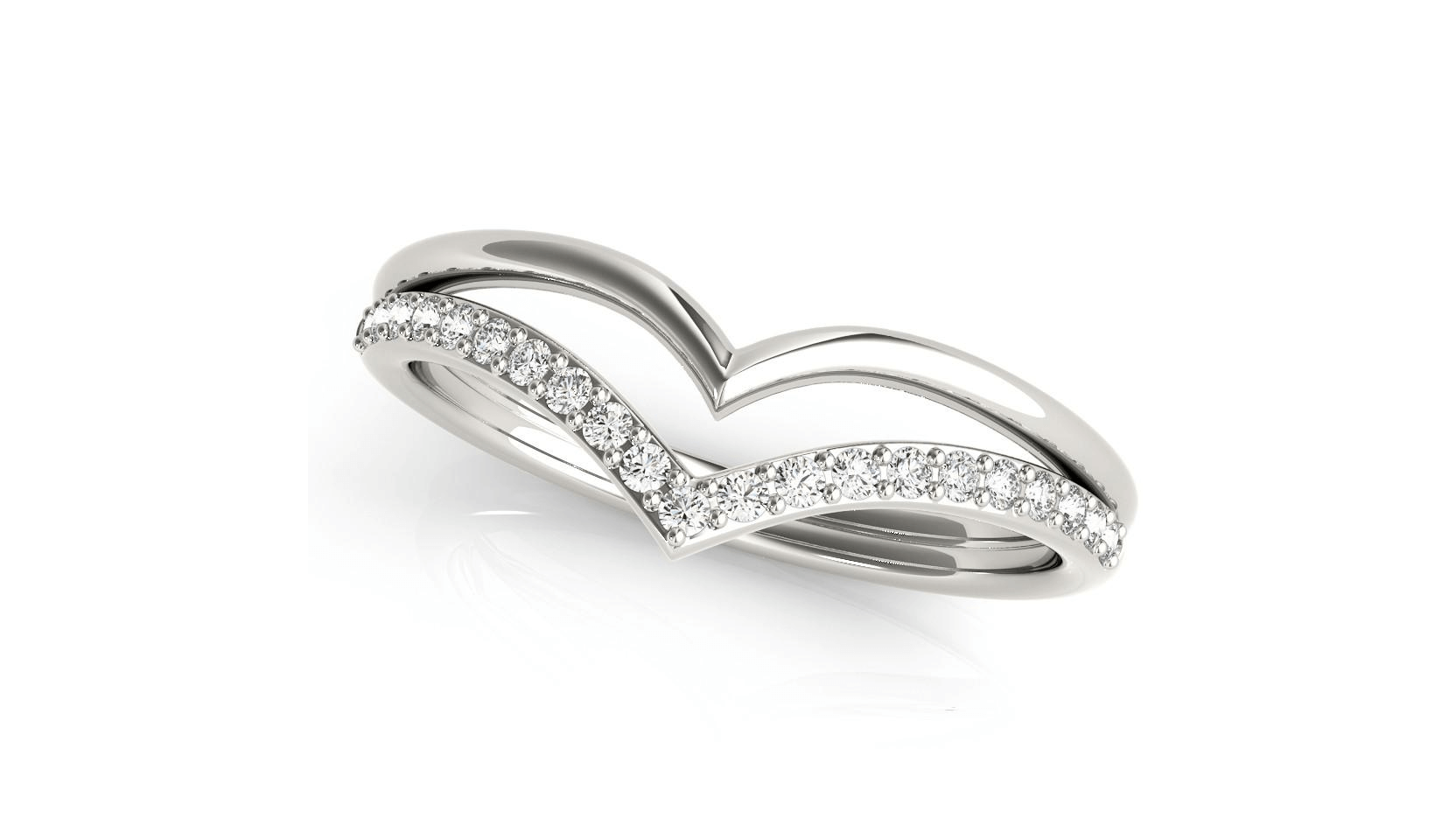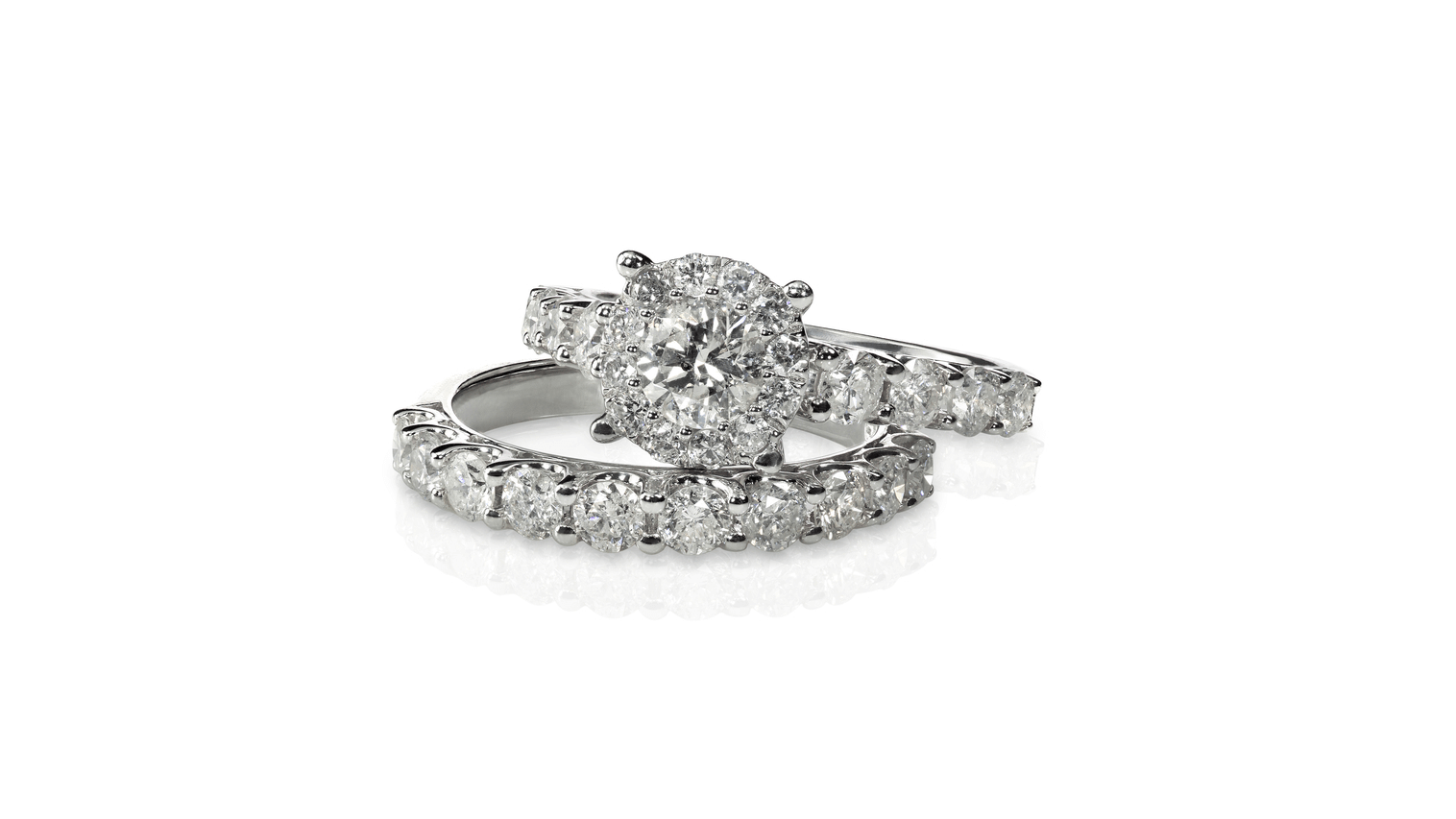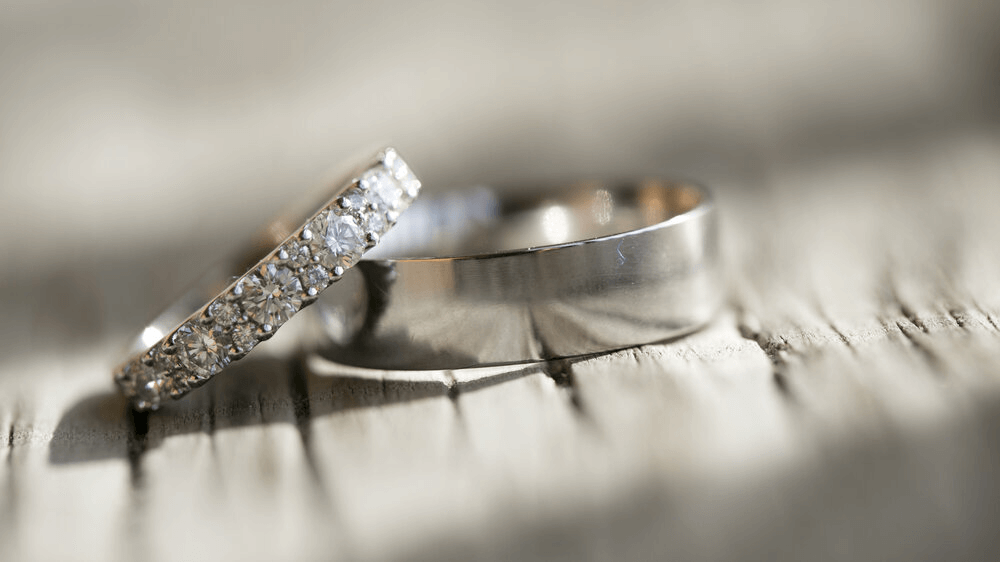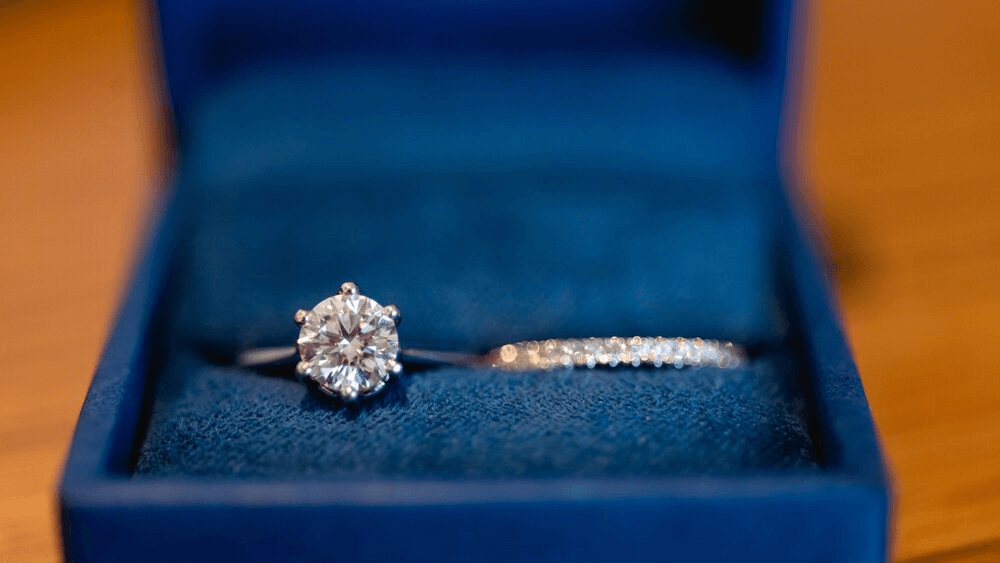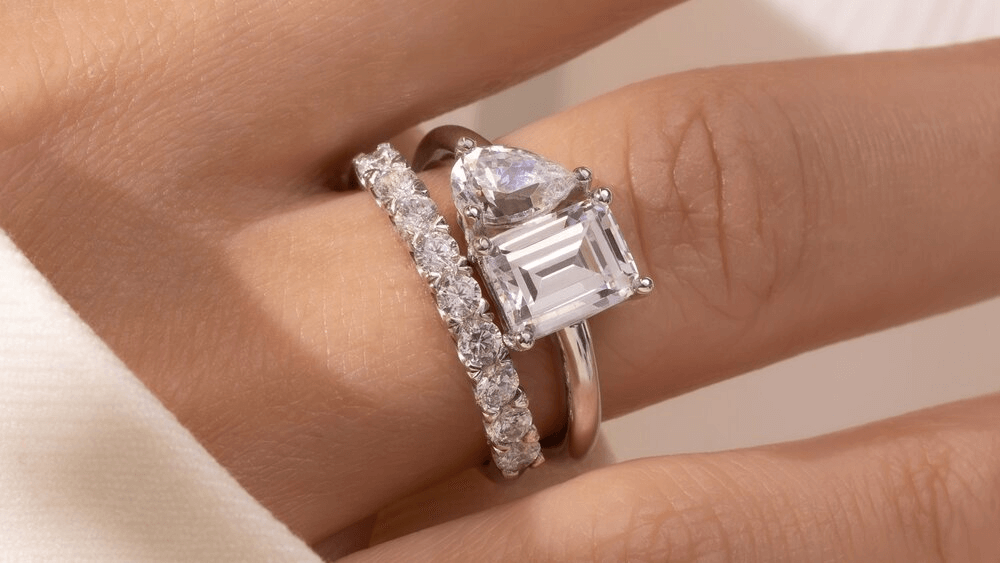Get It Right the First Time: Your Foolproof Guide to Wedding Bands!

By Gary A.

Edited by Olivia H.
Published Dec 24, 2021
Edited on Dec 18, 2024
Choosing wedding bands is an important step, blending personal style with lifelong comfort, and matching it to the perfect engagement ring to create a harmonious set can be a rewarding yet challenging decision.

- 11 Quick Tips for Selecting the Perfect Rings and Where to Buy Wedding Bands
- Introduction
- Selecting the Perfect Band
- Where to Buy Wedding Bands
- Wedding Band Styles
- The Popularity of Tantalum and Titanium
- Budgeting for Bands
- Our Expert Take
- 10 FAQs
Before we dive deeper into the specifics, here are some practical tips to help guide your decision-making process:
11 Quick Tips for Selecting the Perfect Rings and Where to Buy Wedding Bands
When shopping for wedding bands, it’s essential to pay attention to several critical factors to ensure you find the perfect rings for your special day. Here are practical tips to guide you through this important decision.
- Tip 1:Material Matters: Choose the Right Metal Understand Metal Types: From classic gold to modern tungsten, each metal type has its pros and cons. Research and compare metals like platinum, gold (in various karats), palladium, and alternative metals like titanium and tungsten for durability, maintenance, and skin sensitivity. Consider Lifestyle: If you lead an active lifestyle or work with your hands, opt for more durable metals like platinum or tungsten that resist scratches and wear.
- Tip 2:Size and Comfort: Ensuring the Right Fit Proper Sizing: Ensure accurate sizing for comfort and security. Remember, finger sizes can change due to factors like temperature and time of day. Comfort Fit: Consider bands with a comfort fit, especially if you’re not used to wearing rings. These bands have a rounded interior that makes them more comfortable to wear daily.
- Tip 3:Style and Design: Reflecting Personalities Match or Contrast: Decide whether you want your wedding bands to match or if you prefer unique styles that reflect your individual personalities. Complement Engagement Ring: For brides, ensure the wedding band complements the engagement ring in style and design. They should sit comfortably together on the finger. Budgeting: Balancing Cost and Quality Set a Budget: Determine a budget that balances cost without compromising on quality. Remember, wedding bands are an investment in your future. Look for Deals: Keep an eye out for sales, especially during off-peak wedding seasons, to potentially save on costs.
- Tip 4:Inscriptions and Personalization: Adding a Personal Touch Engraving Options: Personalize your bands with an inscription. This could be your wedding date, initials, or a meaningful quote. Custom Designs: If you want something unique, consider custom-designed bands. Many jewelers offer the ability to customize the design to your preference.
- Tip 5:Quality Assurance: Checking for Authenticity Hallmarks and Certifications: Look for hallmarks indicating metal purity and authenticity. If choosing diamond-studded bands, ensure they come with a certification from a reputable lab. Warranty and Return Policies: Check the jeweler’s warranty and return policies. A good warranty can provide peace of mind, covering potential resizing or repairs.
- Tip 6:Online vs. Physical Stores: Where to Shop Explore Both Avenues: Consider both online and physical stores. Online stores often offer a wider range of styles and competitive pricing, but physical stores provide the advantage of trying on rings. Read Reviews: If shopping online, read customer reviews and research the jeweler’s reputation. Look for customer feedback regarding quality, customer service, and the shopping experience.
- Tip 7:Exploring Diverse Venues for the Best Selection Variety of Retailers: Broaden your search beyond traditional jewelry stores. Explore department stores, specialty boutiques, online marketplaces, and artisan jewelers for a diverse range of styles and designs.
- Tip 8:Artisan and Custom Jewelers: Consider visiting local artisan jewelers or craftsmen who specialize in custom designs. They can offer unique, handcrafted rings that stand out from mass-produced options.
- Tip 9:Bridal Shows and Exhibitions: Attend bridal shows and jewelry exhibitions where multiple vendors showcase a variety of wedding bands. These events can offer a one-stop-shop experience to compare different styles and prices.
- Tip 10:Antique Stores and Estate Sales: For those interested in vintage or unique historical designs, antique stores and estate sales can be treasure troves for one-of-a-kind wedding bands.
- Tip 11:Referrals and Recommendations: Ask recently married friends or family for referrals to their jewelers. Personal recommendations can lead you to trusted vendors known for quality and service.
Now that you’ve got these practical tips, use Jeweler AI below to find the perfect engagement ring that suits your style and budget:
Introduction
From the hindsight, wedding bands seem like a pretty simple subject. Unlike the engagement ring, they don’t tend to feature any elaborate designs, or any larger diamonds. What’s more, they don’t need to be purchased in secret, so all discussion over metals, engravings, accents, sizes, and shapes can be kept out in the open.
Then again, these are rings that you will both wear for the rest of your lives. For both of you, picking out something comfortable, something that sits comfortably and aesthetically alongside your bride’s engagement ring, and something that lives up to your expectations of what a ‘wedding band’ should really look like.
Taking all that into account means that picking out wedding bands isn’t as simple as choosing between gold and platinum. It takes thought, and a little more of that ring-buying creativity you’ve acquired in recent months. Just make sure you get your head around the basics before working through the design.
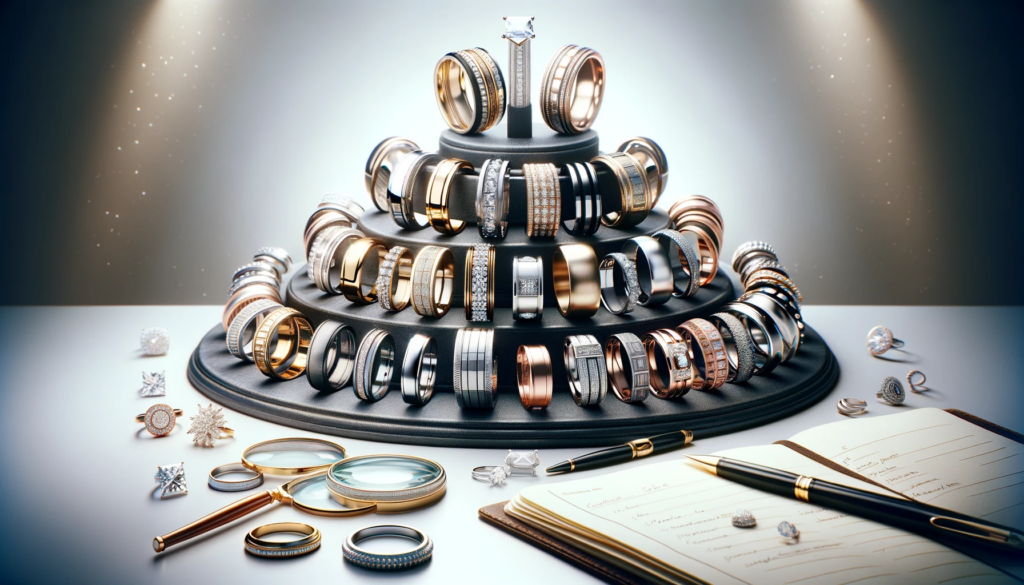
Selecting the Perfect Band
These days, the term ‘wedding ring’ and ‘wedding band’ are used interchangeably. But they do give you different options.The ‘wedding ring’ actually refers specifically to a shank that has been decorated with small diamonds, creating a pavé or channel setting.
The most traditional choice is the wedding band: a plain, solid metal ring.
Where to Buy Wedding Bands
It’s best to buy a wedding band with a reputable online seller who puts the emphasis on quality over too-good-to-be-true prices.
We’ve already mentioned how wedding bands are nowhere near as complex as engagement rings. For the most part, they’re plain – or decorated only with a small flush-set diamond or pavé setting. And, unless you’re specifically designing your wedding band around the shape of your engagement ring, they are typically a simple circle shape – something that’s comfortable to wear day in, and day out.
The simplicity of the band you have in mind is not an invitation to skimp. A solid gold or platinum ring will always cost you, since these metals are both considered highly valuable. Cheaper alternatives tend to be gold plated, vermeil or “gold-filled” – all options that will start to lose their beautiful appearance after as little as a few months’ of solid wear.
If you were over the moon with your engagement ring, then why not replicate that experience with us again?? Returning to our shop is a great moment to celebrate this next milestone, and make sure that your wedding bands are in good hands.
Ideal Time to Buy
Most wedding planners would recommend that you order your wedding bands at least three months before the big day itself, if not a little sooner.
Unlike the wedding dress, which needs to be fitted as close to the wedding day as possible, the wedding bands are safe to purchase and bring home in plenty of time. Sure, most jewelers will be able to hand them over to you in a matter of weeks, rather than months, but that’s not taking into account the time you spend thinking over designs, costs, and metals.
Nobody wants to have to rush through this important step, so give yourselves plenty of time.
Wedding Band Styles
While there will always be plenty of traditionalists out there, there is absolutely no need for your wedding band to conform with tradition, or meet expectations.
Material and Design Choices
The material and design choice is, of course, up to the wearer. While undecorated wedding bands are traditional, plenty of men and women have elected to add a little something extra to the design – whether for style, or meaning.
Diamonds, for instance, are by no means limited to engagement rings – or even just the brides of the world. For a groom, opting for a flush setting with two small diamonds offers the perfect opportunity to represent you both within the band, without getting too flashy.
For brides, opting for a pavé shank can be a great way to complement the sparkle of your engagement ring, but you might want to consider how it’ll sit alongside an eternity ring in the future.
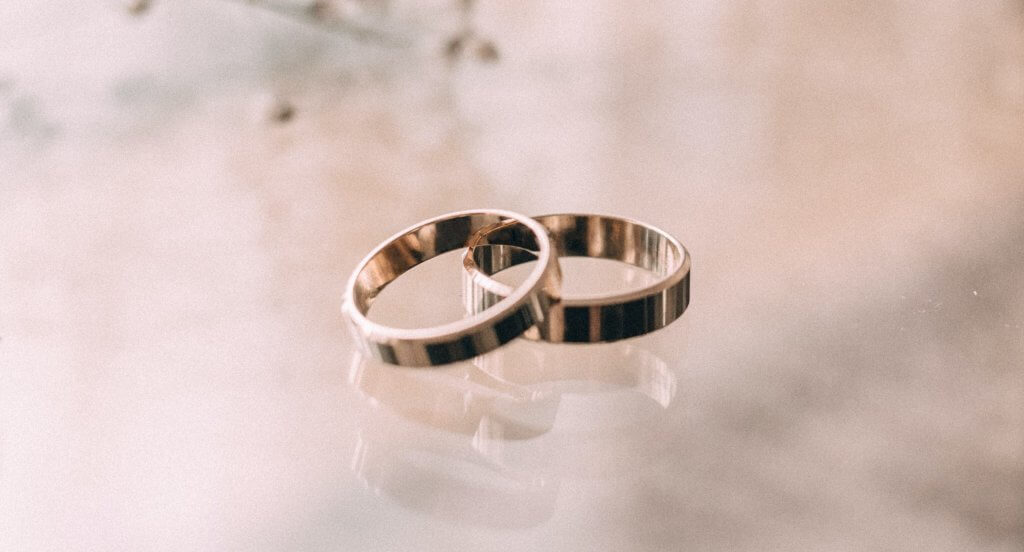
Trending Styles in Wedding Bands
There’s no right or wrong shape when it comes to wedding bands. For instance, while most wedding rings are round, chevron has become an incredibly trendy option, as this shape can stack comfortably alongside her engagement ring.
The important thing to consider is coherence and comfort. While a bulky halo setting may mean that you need to think about designing the wedding band around the engagement ring, something that holds the center diamond higher above the finger (like a Cathedral Setting) will probably fit fine alongside a round wedding band.
For rings that take up more space, you might want to consider finding a bridal set that prioritizes maximum comfort. Besides, an irregularly shaped wedding band can look extremely modern and elegant, so don’t feel stuck on the round band.
The Popularity of Tantalum and Titanium
Another popular trend right now is black wedding bands for men. There’s no specific symbolic reason behind this choice. It comes down to personal preference more than anything else.
Black wedding bands are pretty dramatic. Masculine, modern-looking and bold, they are the perfect choice for any groom looking to pick out a wedding band that really speaks to his own sense of style. There’s nothing wrong with breaking from tradition and ditching gold and platinum in favor of a black titanium, black stainless steel, or tantalum instead – and, if you have a strong sense of what you like and don’t like, it’s by far the better option.
Matching Bands: To Sync or Not?
There’s nothing that says you need to sync your wedding bands. In fact, it’s far better to embrace your differences and pick out two styles that suit each of you equally than to force yourselves to match.
If your bride-to-be wears gold jewelry, then chances are that you picked out a gold engagement ring, and that she’ll want to keep the cohesiveness going and pick out a gold wedding band, too.
If you prefer the brightness of white gold and platinum – or the uniqueness of a tungsten or stainless steel band – then there’s no use you settling with a gold wedding band for the sake of it. These two rings hold their meaning beneath the surface, and the way they look has nothing to do with what they represent, so don’t get caught up on matching if you and your partner have different senses of style.
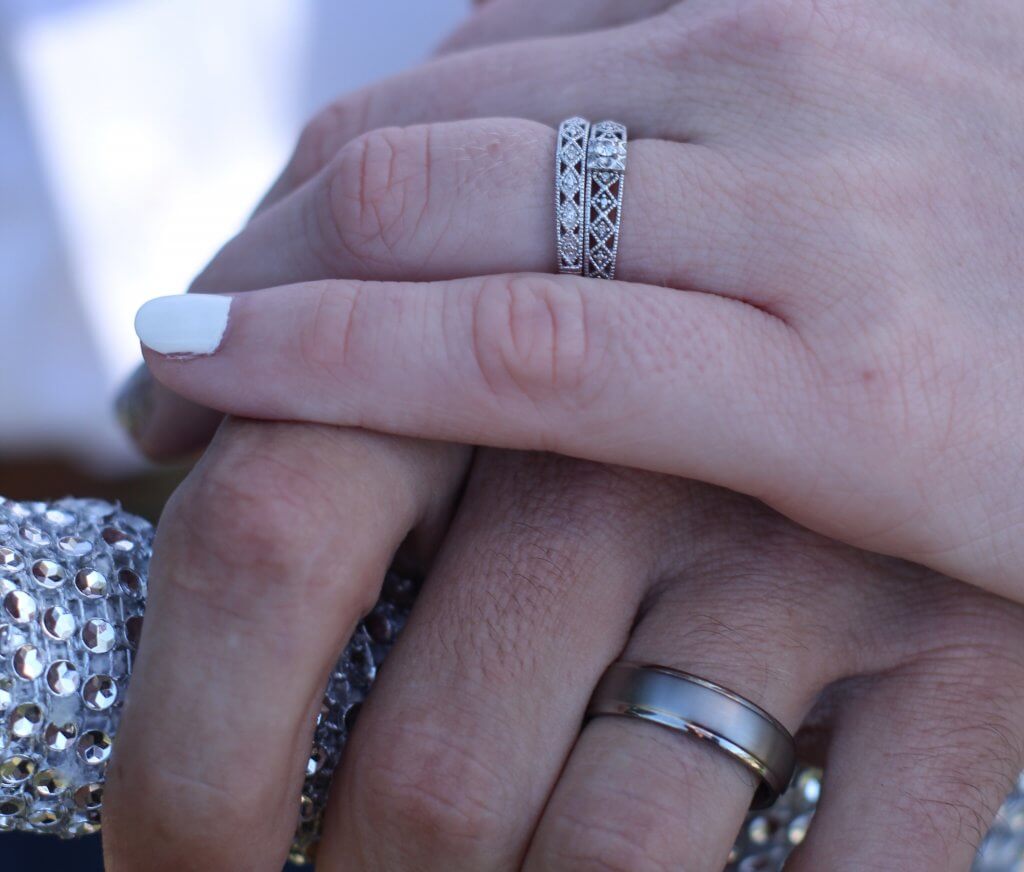
Budgeting for Bands
Buying the wedding bands isn’t just about finding a ring you like and purchasing immediately. This should be a joint decision the couple.
Most couples elect to treat them like gifts, and purchase one another’s rings. In some families, the parents of the bride and groom like to take over a lot of the most important costs, and this might include the wedding bands – although we’d recommend waiting until they come to you, rather than the other way around.
If the two of you are taking on the bulk of the wedding costs together – or you just want to keep the rings, one of the most meaningful aspects of the ceremony, between the two of you – then browsing our online collection together and paying for one another’s rings can be a great experience, and ensure you’re both happy with the designs.
Understanding Pricing Variations
Unless you’re after a highly complex design, we’d recommend you set aside between $750 and $1,000 to cover the two bands. You might not need to use the whole budget, but it’s better to set aside a little too much (and put what’s leftover toward the honeymoon) than not enough.
Wedding bands are a lot cheaper than engagement rings, but, as we mentioned above, there are certain features you do not want to skimp on.
For a lot of people, gold is the obvious choice, but working out what karat type is right for you isn’t quite so easy. You can take a look at our guide to gold before rushing to any conclusions, since balancing cost with beauty is key here. Again, never be lured in by gold filled or plated jewelry; even if you’re opting for a 10K gold wedding band, you want it to be solid.
Also keep in mind that platinum and palladium are much more expensive choices than, say, 14K white gold, but definitely worth it if you can saddle the extra cost.
Our Expert Take
Taking on the wedding bands is a great moment for any couple. A lot of the wedding planning process centers on things that will last for that one day – the cake, the music, the dress, and the entertainment – but the wedding bands will last longer than all of that stuff combined.
If you shopped with us for your engagement ring, returning to our services is not only the best way to ensure the same excellent quality and aftercare, but also to celebrate another milestone and to make a mini celebration out of the process.
10 FAQs
- Q: Do Wedding Bands Have to Match?
- A: No, wedding bands don’t have to match. Many couples choose bands that reflect their individual styles and preferences.
- Q: How Much Should You Spend on Wedding Bands?
- A: The amount varies significantly depending on personal budgets and preferences. On average, couples might spend between $500 to $2000 per band.
- Q: When Should You Buy Wedding Bands?
- A: It’s advisable to purchase wedding bands at least three to six months before the wedding. This allows time for customization and resizing if needed.
- Q: Can Wedding Bands Be Resized?
- A: Most wedding bands can be resized. However, some designs or materials, like those with intricate patterns or made of certain metals, may be more challenging to alter.
- Q: Is It Okay to Buy Wedding Bands Online?
- A: Yes, it’s okay to buy wedding bands online, especially from reputable jewelers. Ensure they have a good return policy and customer reviews.
- Q: Should Our Wedding Bands Be the Same Metal as the Engagement Ring?
- A: While not a requirement, matching the metal of the engagement ring and wedding band can create a cohesive look.
- Q: Can You Wear Your Wedding Band Before the Wedding?
- A: Traditionally, wedding bands are first worn at the wedding ceremony. However, personal preferences and cultural practices may vary.
- Q: How Do You Choose the Right Size for a Wedding Band?
- A: Your ring should fit comfortably; snug enough not to fall off, but loose enough to slide over your knuckle. Professional sizing by a jeweler is recommended.
- Q: Is Engraving Wedding Bands Popular?
- A: Yes, many couples choose to engrave their wedding bands with a special date, initials, or a personal message.
- Q: What’s the Difference Between a Wedding Band and an Engagement Ring?
- A: An engagement ring is typically more ornate and often features a prominent stone. A wedding band is usually simpler and is exchanged during the wedding ceremony.
Discover your perfect band with Jeweler AI – where precision meets passion.
FOLLOW-UP GUIDE SERIES

